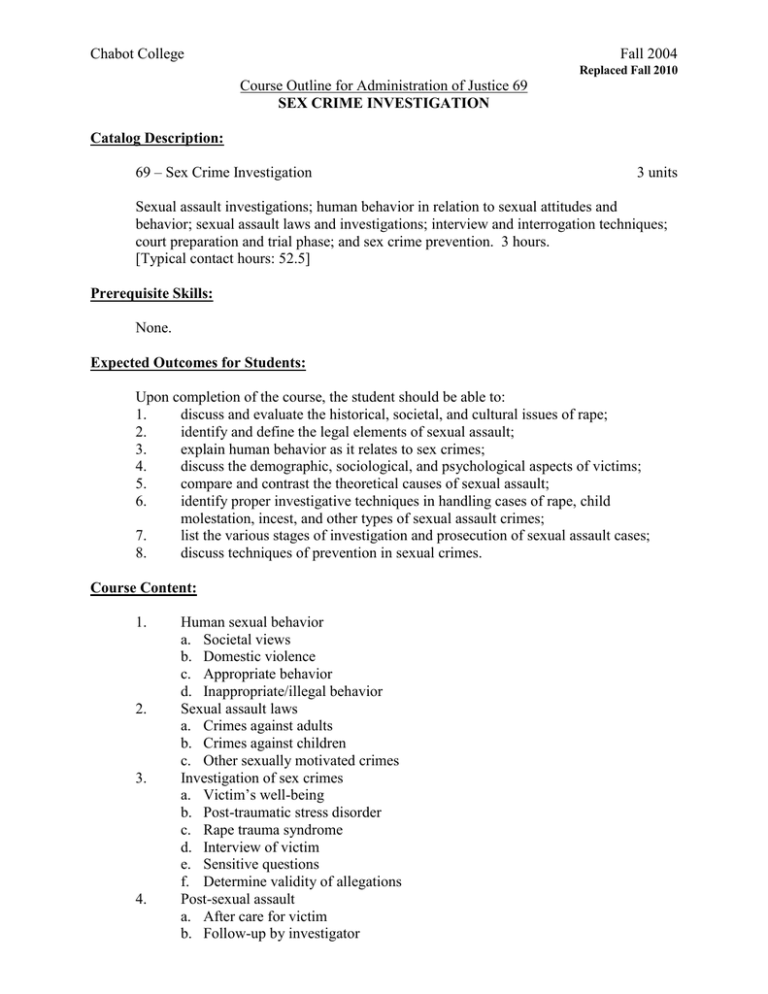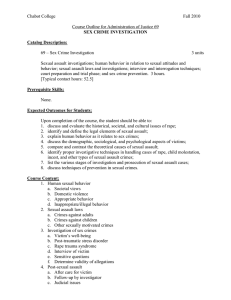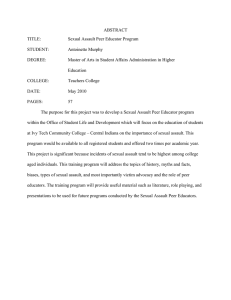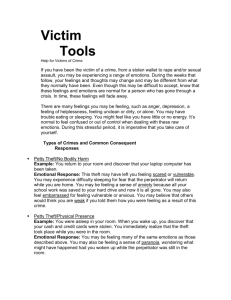
Chabot College
Fall 2004
Replaced Fall 2010
Course Outline for Administration of Justice 69
SEX CRIME INVESTIGATION
Catalog Description:
69 – Sex Crime Investigation
3 units
Sexual assault investigations; human behavior in relation to sexual attitudes and
behavior; sexual assault laws and investigations; interview and interrogation techniques;
court preparation and trial phase; and sex crime prevention. 3 hours.
[Typical contact hours: 52.5]
Prerequisite Skills:
None.
Expected Outcomes for Students:
Upon completion of the course, the student should be able to:
1.
discuss and evaluate the historical, societal, and cultural issues of rape;
2.
identify and define the legal elements of sexual assault;
3.
explain human behavior as it relates to sex crimes;
4.
discuss the demographic, sociological, and psychological aspects of victims;
5.
compare and contrast the theoretical causes of sexual assault;
6.
identify proper investigative techniques in handling cases of rape, child
molestation, incest, and other types of sexual assault crimes;
7.
list the various stages of investigation and prosecution of sexual assault cases;
8.
discuss techniques of prevention in sexual crimes.
Course Content:
1.
2.
3.
4.
Human sexual behavior
a. Societal views
b. Domestic violence
c. Appropriate behavior
d. Inappropriate/illegal behavior
Sexual assault laws
a. Crimes against adults
b. Crimes against children
c. Other sexually motivated crimes
Investigation of sex crimes
a. Victim’s well-being
b. Post-traumatic stress disorder
c. Rape trauma syndrome
d. Interview of victim
e. Sensitive questions
f. Determine validity of allegations
Post-sexual assault
a. After care for victim
b. Follow-up by investigator
Chabot College
Course Outline for Administration of Justice 69, Page 2
Fall 2004
5.
6.
7.
8.
9.
c. Judicial issues
1) prosecutor
2) rape crisis centers
3) court appearances
General overview of sex offenders
a. Sex crimes yesterday, today and tomorrow
b. Ethnic factors
c. Religious factors
d. Economic factors
The offender
a. Who offends
b. Psychological and sociological issues
c. Treatment philosophies and programs
Children as victims
a. Interviewing juveniles
b. Children at risk
c. Child accommodation syndrome
Court preparation
a. Proper report writing
b. Thorough investigation
Sex crime prevention
a. Preventative philosophies
b. Implementation
Methods of Presentation:
1.
2.
3.
4.
5.
Lecture and discussion
Audio-visual materials
Role playing
Guest speakers
Investigative scenarios
Assignments and Methods of Evaluating Student Progress:
1.
2.
Typical Assignments
a. Research court decisions applicable to a specific crime
b. Compose questions to stimulate discussion with guest speaker
c. Answer study questions at the end of selected chapters
d. Prepare for a role-playing exercise between a victim and policeman
Methods of Evaluating Student Progress
a. Attendance and participation
b. Research project
c. Quizzes, midterm and final
Chabot College
Course Outline for Administration of Justice 69, Page 3
Fall 2004
Textbook(s) Typical:
Criminal Investigation Basic Perspectives, Weston and Wells, Prentice Hall
Publishing Company, 2002, or latest edition.
Special Student Materials:
None.
sb:/word/AJ69
Revised: 11-6-03



